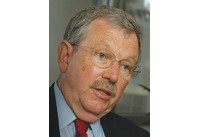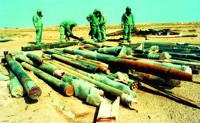Advertisement
Grab your lab coat. Let's get started
Welcome!
Welcome!
Create an account below to get 6 C&EN articles per month, receive newsletters and more - all free.
It seems this is your first time logging in online. Please enter the following information to continue.
As an ACS member you automatically get access to this site. All we need is few more details to create your reading experience.
Not you? Sign in with a different account.
Not you? Sign in with a different account.
ERROR 1
ERROR 1
ERROR 2
ERROR 2
ERROR 2
ERROR 2
ERROR 2
Password and Confirm password must match.
If you have an ACS member number, please enter it here so we can link this account to your membership. (optional)
ERROR 2
ACS values your privacy. By submitting your information, you are gaining access to C&EN and subscribing to our weekly newsletter. We use the information you provide to make your reading experience better, and we will never sell your data to third party members.
Policy
Iraq Had No Illicit Weapons
Report finds sanctions, international inspections contained Saddam's threat
by Lois Ember
October 11, 2004
| A version of this story appeared in
Volume 82, Issue 41
Report finds sanctions, international inspections contained Saddam's threat
Testifying before the senate Armed Services Committee, chief U.S. weapons inspector Charles A. Duelfer outlined key findings of a report on Iraq's prewar weapons holdings that sharply undercut the Bush Administration's primary reason for invading Iraq.
Duelfer, an experienced former United Nations weapons inspector, told the senators that Saddam Hussein had no stockpiles of illicit weapons nor the capability to produce them when the U.S invaded Iraq in March 2003. But, he said, Hussein was subverting UN sanctions by importing dual-use equipment and had every intention of reestablishing his weapons programs.
The conclusions of the 16-month search for Iraq's weapons of mass destruction conducted by Duelfer's Iraq Survey Group are compiled in a massive report released on Oct. 6. They largely underscore the findings of Duelfer's predecessor, David A. Kay. Also echoing Kay's January testimony, Duelfer admitted to the senators, "We were almost all wrong" about Iraq's weapons.
Duelfer's report names companies, countries, and individuals--some of whom are U.S. allies--who aided Hussein's effort to thwart UN sanctions. And for the first time, it offers evidence that Iraq's intelligence service was using secret labs to produce chemical and biological agents on a small scale, probably for assassinations.
Duelfer said Iraq's weapons and its production capabilities were essentially destroyed in 1991. Its chemical industry, for instance, could conduct some dual-use research but had only partially recovered the production capability that had been devastated by past Gulf wars and ongoing sanctions. But, he said, when sanctions were removed, Hussein intended to focus on developing ballistic missiles, tactical chemical weapons, and a nuclear capability.
Kay tells C&EN that Iraq's science and technology base was too seriously degraded to turn intentions into actual weapons. In fact, Kay is doubtful that Hussein could have reconstituted his weapons programs: "The regime was descending into this vortex of corruption, and I just don't think he could have done it."





Join the conversation
Contact the reporter
Submit a Letter to the Editor for publication
Engage with us on Twitter